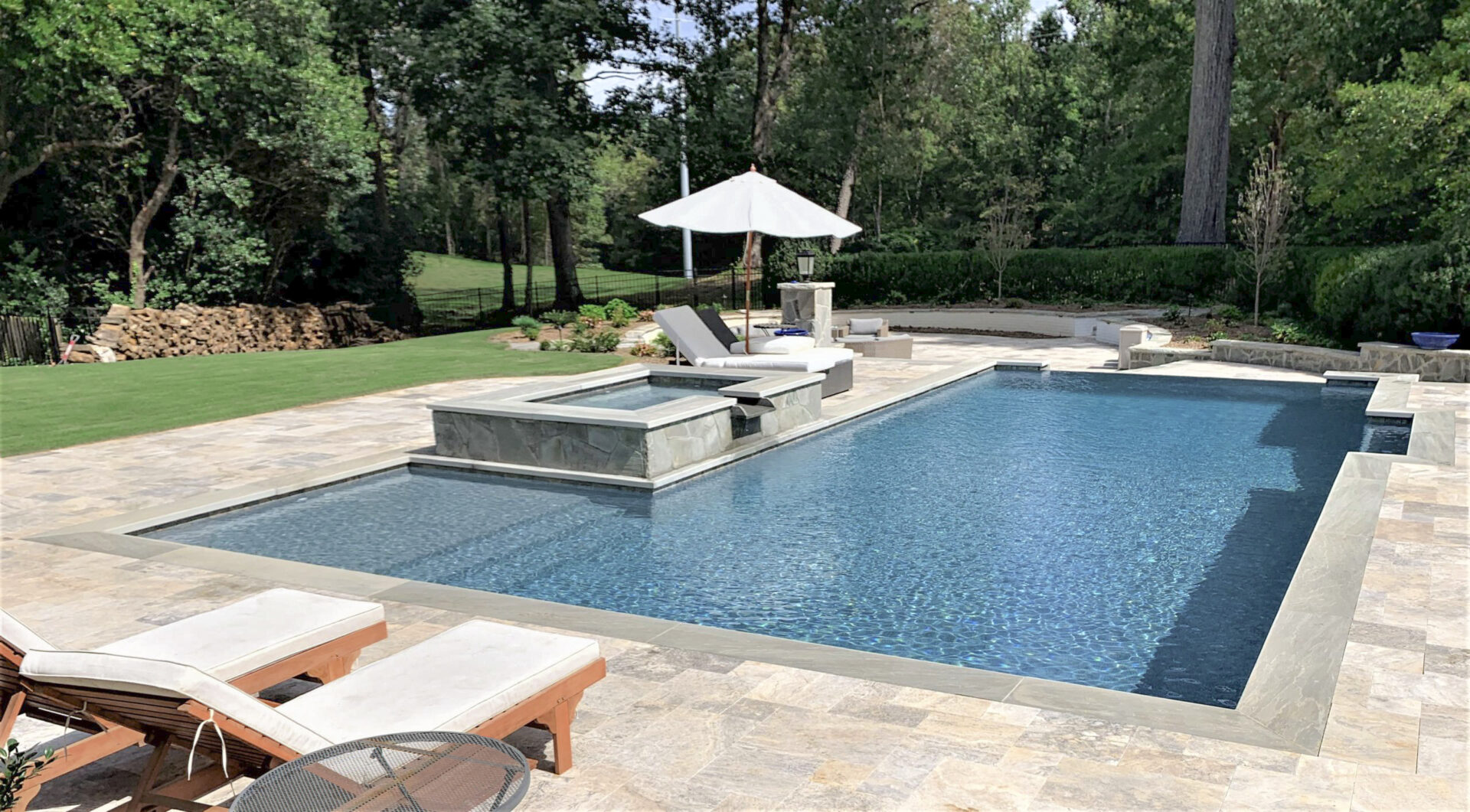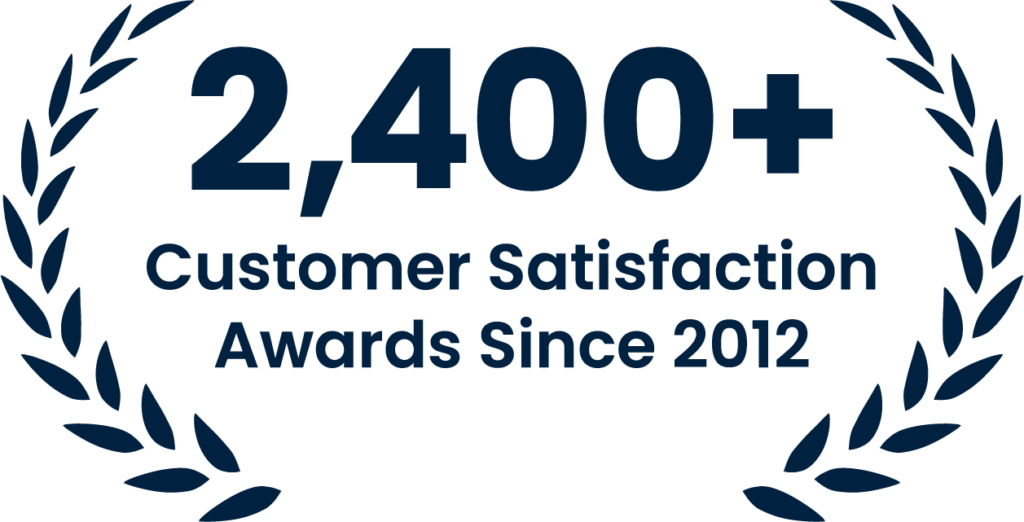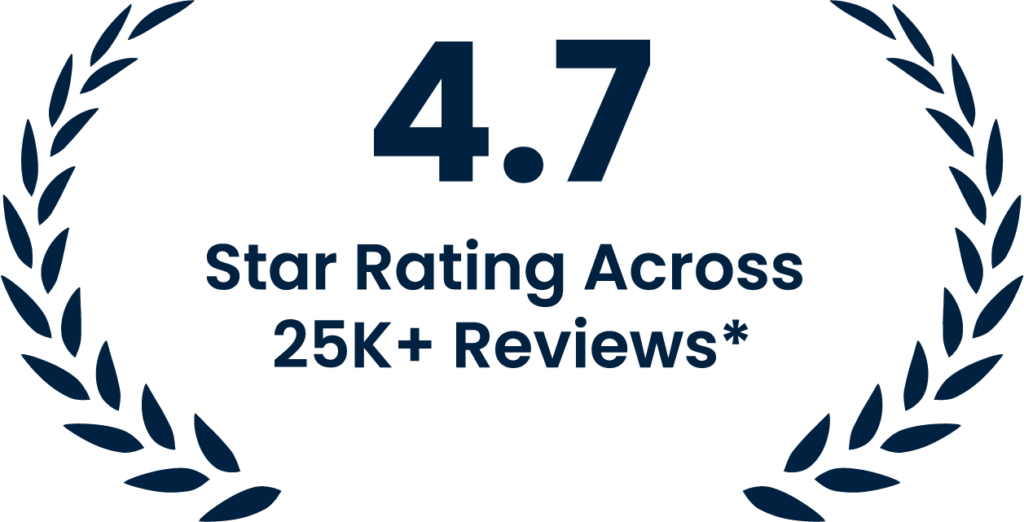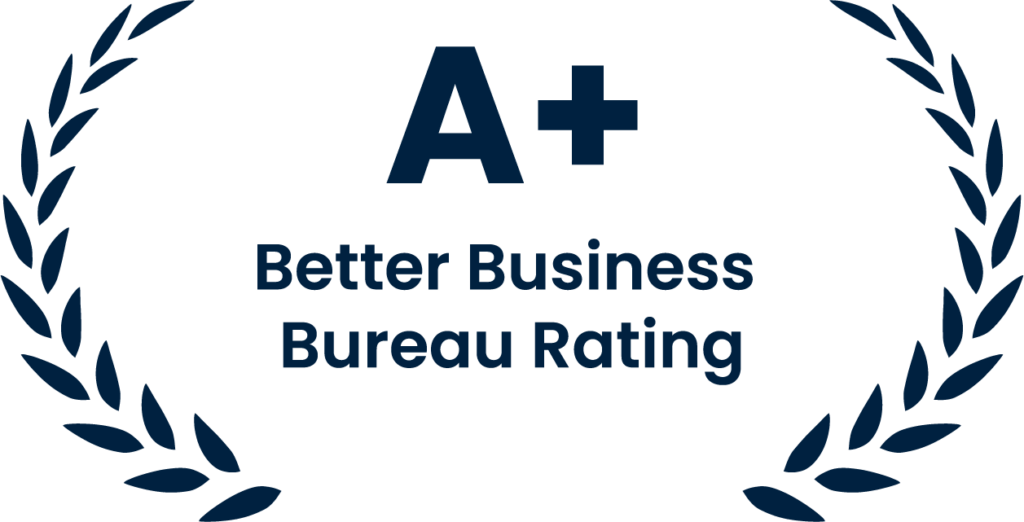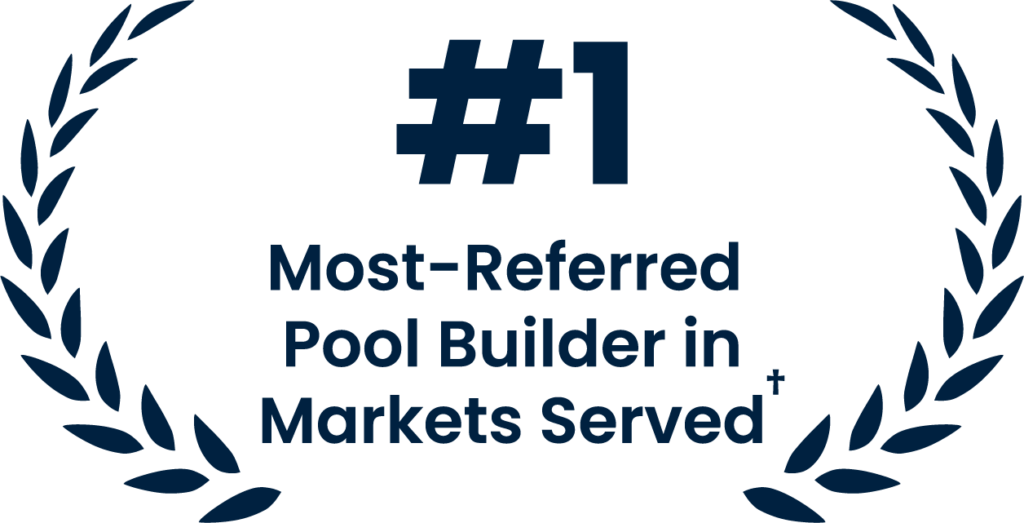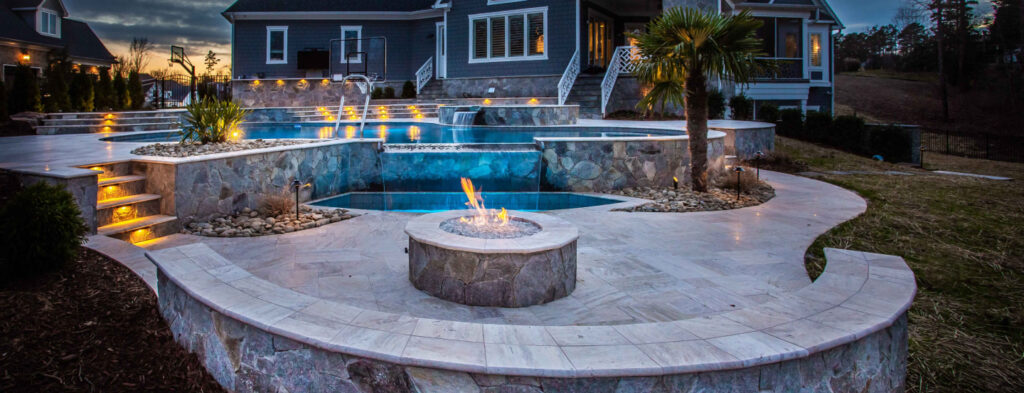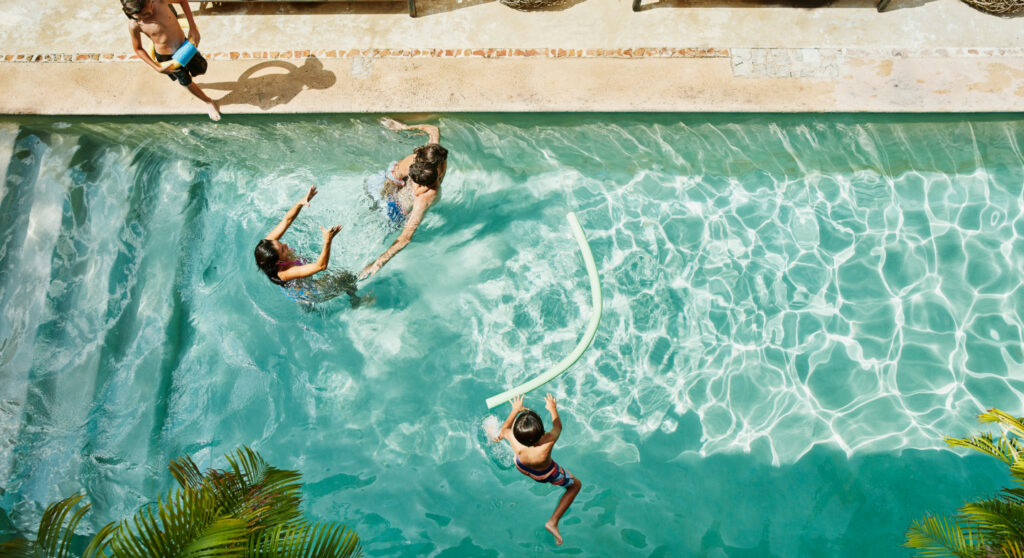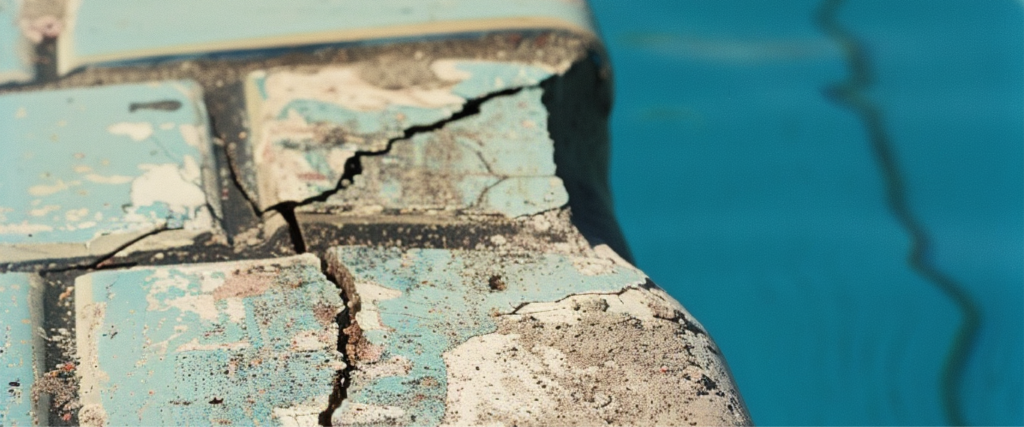When planning for a pool, it’s helpful to understand the factors that influence both installation costs and ongoing expenses. Here are some top considerations to keep in mind.
1. Pool Material
Pools are typically made from your choice of three materials: concrete, fiberglass, or vinyl. Each material has its own pros, cons, and associated costs. Additionally, upgrades are available but can impact how much you’ll pay. Here’s an overview of each type of pool material:
Concrete Pools
Concrete pools, also known as gunite pools, are made from a mixture of sand, cement, and water. These pools are handcrafted, which provides unrivaled customization to make the pool in any shape or style. They also offer exceptional durability with a lifespan of 50-100 years, and some companies like Anthony & Sylvan offer a Lifetime Warranty.
Fiberglass Pools
Fiberglass pools are prefabricated in an off-site facility, then delivered and installed in the backyard as a single piece. As a result, fiberglass pools tend to offer the fastest installation times of any pool type. However, fiberglass pools lack the customization options of a concrete pool and have a lifespan of around 25 years.
Vinyl Pools
Vinyl pools are the cheapest type of pool, and are made from plastic polymer or steel. These materials offer the least durability and lowest lifespan of any pool type, and require the homeowner to replace the vinyl liner every 10 years.
2. Size and Depth of the Pool
The size, depth, and shape of your pool are major factors in determining its cost. As you would expect, the cost of a pool will increase in correlation to its size and depth.
For context, most backyard pools are between 10-20 feet wide, 20-40 feet long, and 5-8 feet deep, and there are many design options for future pool owners to consider. Perhaps you’re Imagining turning a small yard into a serene escape with a compact plunge pool, or blending relaxation and practicality with a swim spa. Are you drawn to the flowing curves of a freeform pool, or do you prefer the crisp, clean lines of a geometric design. Features such as beach entries offer a gentle slope into the water, vanishing edges create luxurious views, and sun shelves provide the perfect spot for lounging.
Whether you’re just starting to consider your options or already have a specific vision in mind, Anthony & Sylvan’s expert pool builders can guide you toward a design that complements your space and lifestyle.
Looking for inspiration? Visit our Southeast Pool Pricing Page to explore designs and pricing options.
3. Leveling and Excavation
The terrain of your backyard can impact the cost of your pool. Uneven yard elevations may require leveling before construction begins, which would add to expenses. Excavation costs vary based on the size and depth of your pool, but they can increase if challenges such as removing trees, relocating plumbing, or dealing with rocky or clay-heavy soil arise. To provide an accurate estimate, a soil test may be conducted before construction starts.
4. Add-ons and Features
When building a new pool, you may be able to choose from optional upgrades and equipment to enhance its aesthetic and functionality. Common pool features include:
You may also wish to take your new pool to the next level with backyard features like a sunken pool bar for ultimate relaxation or a cozy fire pit and outdoor kitchen to create the perfect place to relax and entertain.
5. Utilities
Beyond the initial construction, your pool will come with ongoing utility costs. Filling your pool, typically done using tap water from a garden hose, can take 12–72 hours. Some pool companies like Anthony & Sylvan will pay for the water themselves, but otherwise, that cost will be on you. The cost of this process will depend on your local water rates. Additionally, you’ll need to account for water cycling, which contributes to your regular water bill.
On that same note, you should consider an increase in your electric bill as well, as pool pumps and other equipment require power to run efficiently. If you opt for a saltwater pool, you’ll need to factor in the cost of replacing salt bags periodically to maintain your system.
6. Local Requirements
When building a new pool in Charlotte, you’ll need to comply with local requirements. You can check with your local government for resources on the building codes and application process for more information. You can also check with your builder, as companies like Anthony & Sylvan will handle this process and compliance requirements for you. Key requirements that will impact your pool’s cost include:
- Permits: Prior to construction, you’ll need to apply for a building permit, which can vary by county. Some builders like Anthony & Sylvan will pay for permit fees, so make sure to check during your initial consultation.
- Fencing: North Carolina’s building code requires a fence around the pool that must be at least 48 inches in height, with a maximum clearance of 2 inches below the fence. The fence must also be equipped with an access gate that uses a self-closing device and a latch.
- Water Discharge: When replacing the water in your pool, you’ll need to check your area’s rules for water disposal. Prior to disposal, you’ll need to dechlorinate the water and may need to obtain a permit from your local government.
7. Taxes
Installing an inground pool can boost your home’s value by 5–7% on average, but it may also lead to higher property taxes. If your pool is being installed for medical purposes, you might qualify for a tax deduction on installation and maintenance costs.
8. Insurance
When you build a new pool, you’ll need to contact your homeowner’s insurance provider to update your policy. While your premiums may increase slightly—typically around $50 a year—this added coverage can protect your investment by covering potential pool damage and offering liability protection for medical expenses or accidents.
9. Maintenance
Owning a pool does come with ongoing maintenance expenses. Regular maintenance includes purchasing chemicals to keep the water clear as well as performing routine cleaning and vacuuming.
Maintenance needs also vary by pool type: fiberglass pools may require occasional gel coat repairs for scratches, vinyl pools typically need a new liner every 10 years, and concrete pools require acid washes every 3–5 years along with resurfacing every 8-20 years depending on the type of finish. Planning for these costs ensures your pool stays in excellent condition for years to come.
If you want to enjoy your pool without worrying about the hassle of regular maintenance, Anthony & Sylvan provides professional maintenance services.

